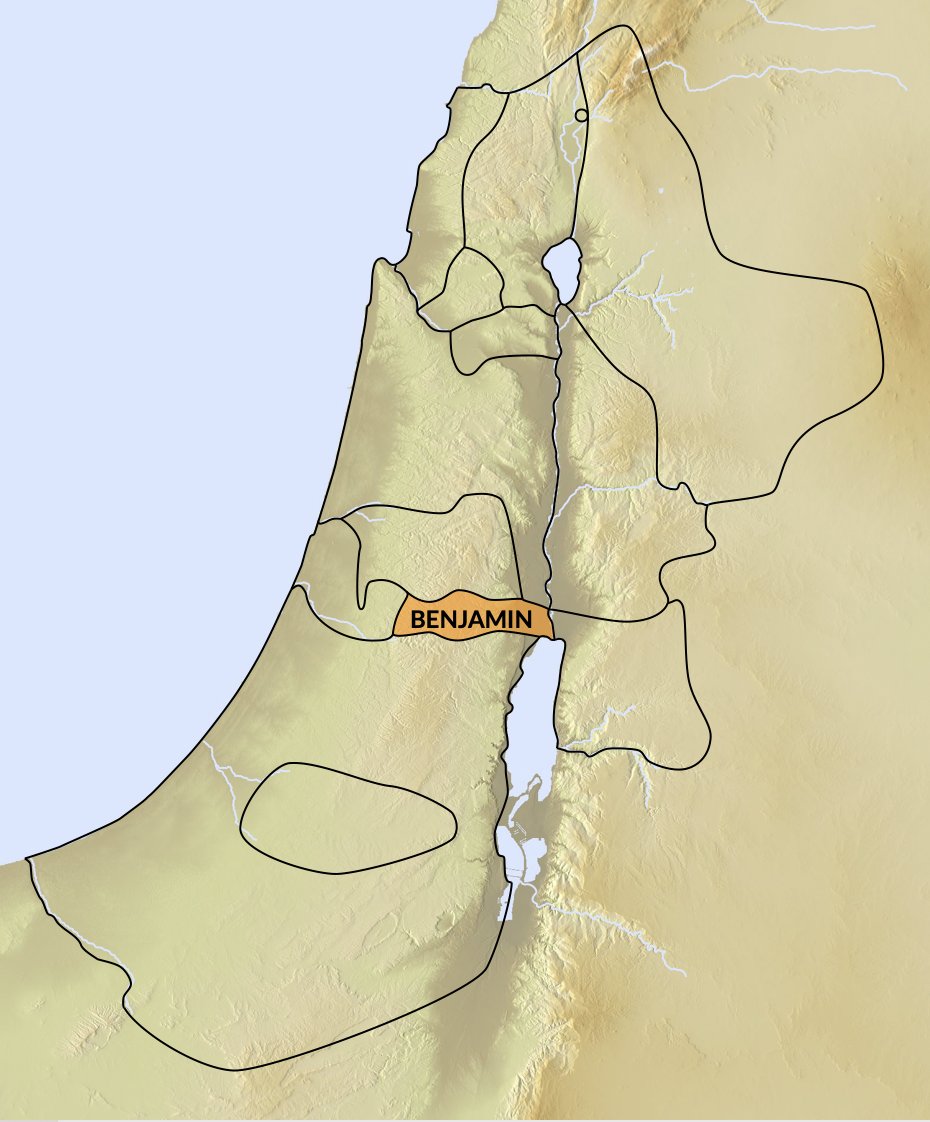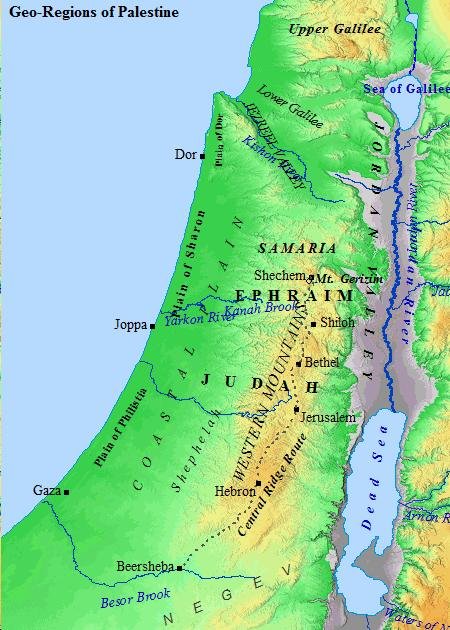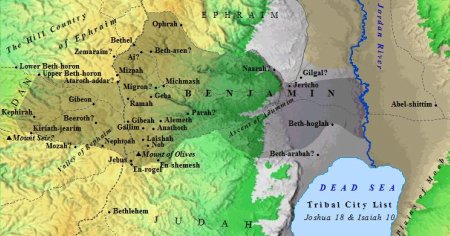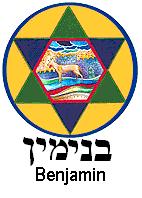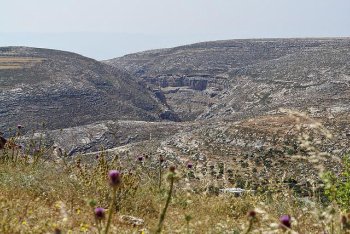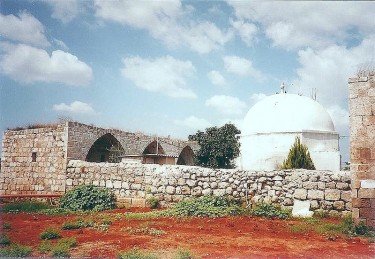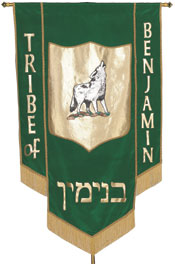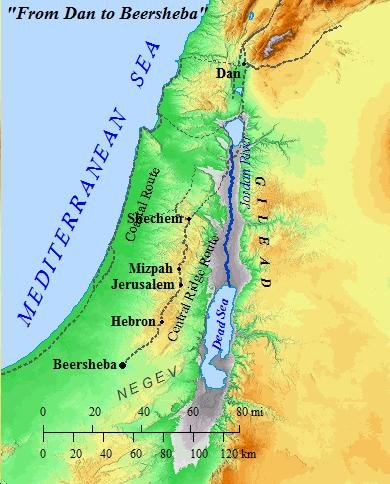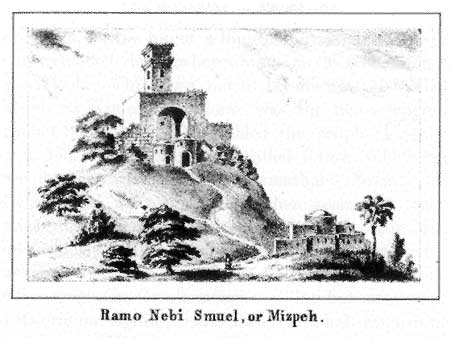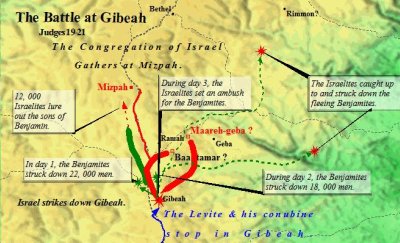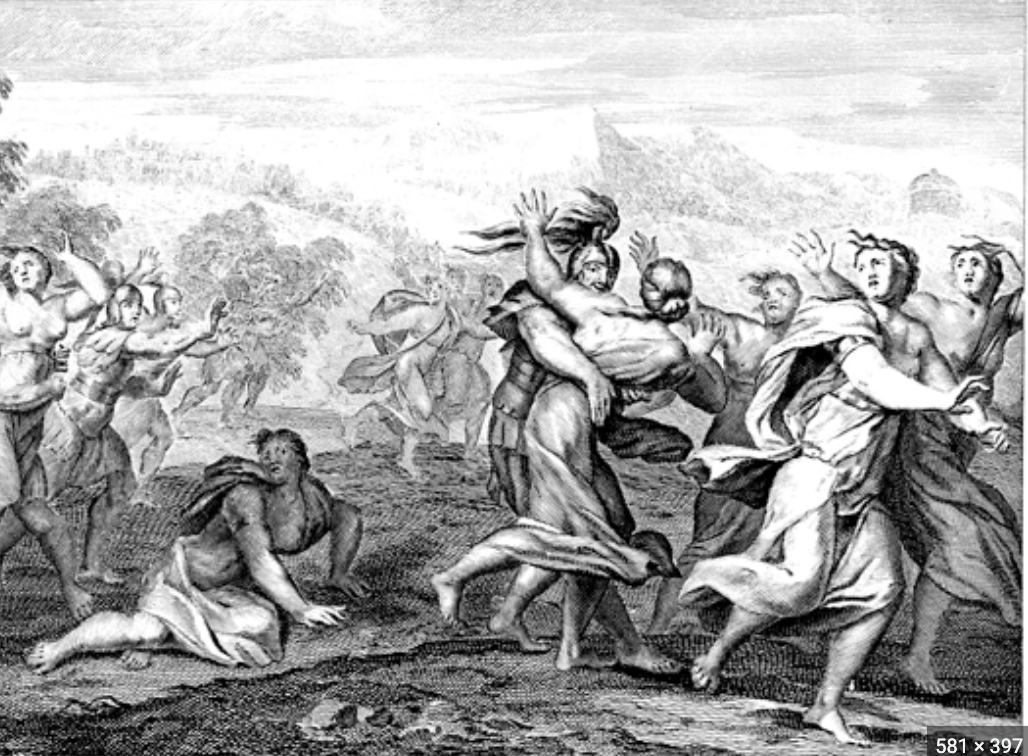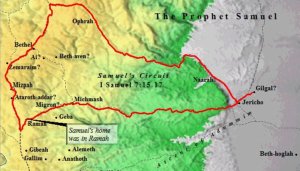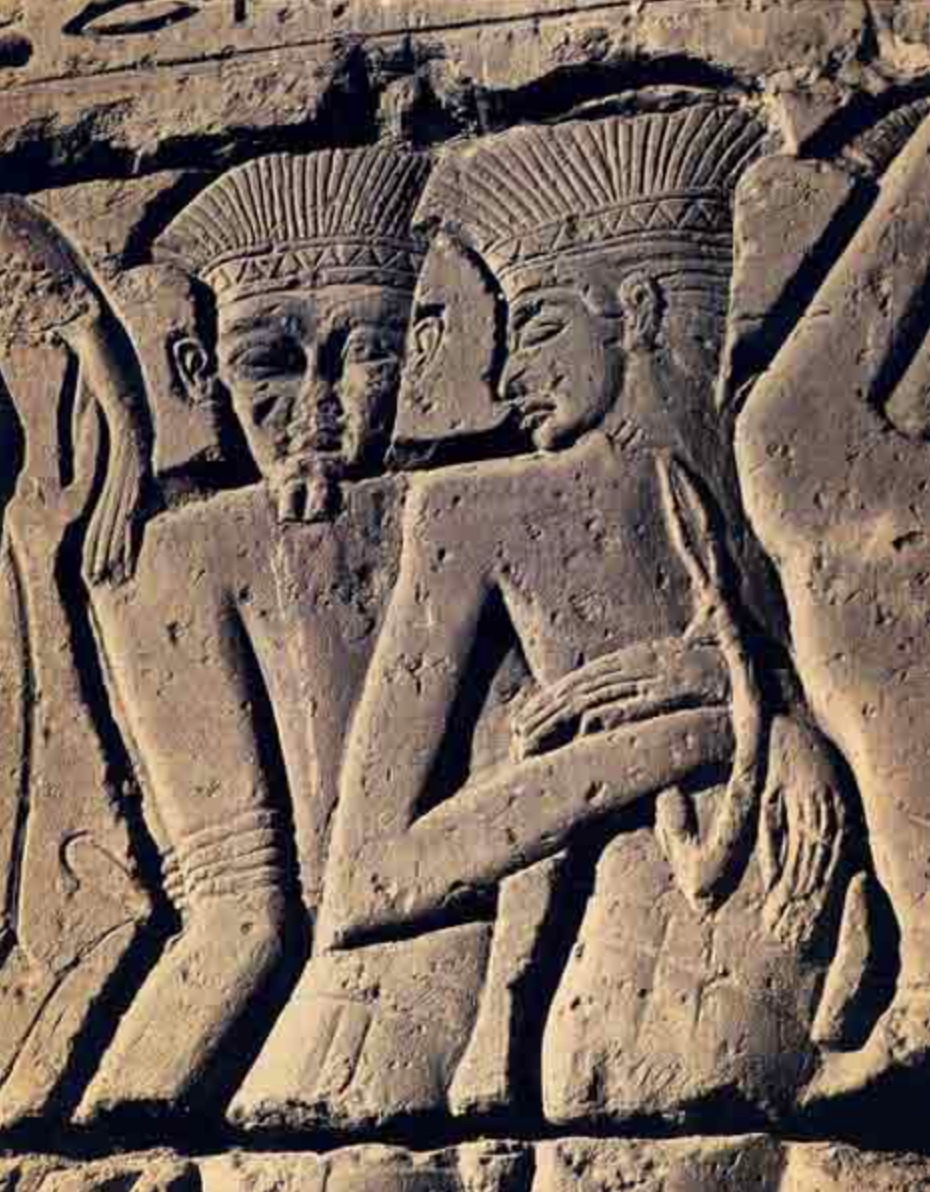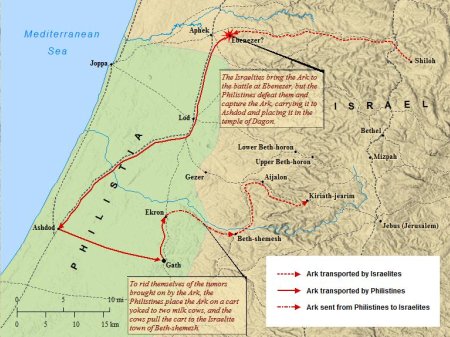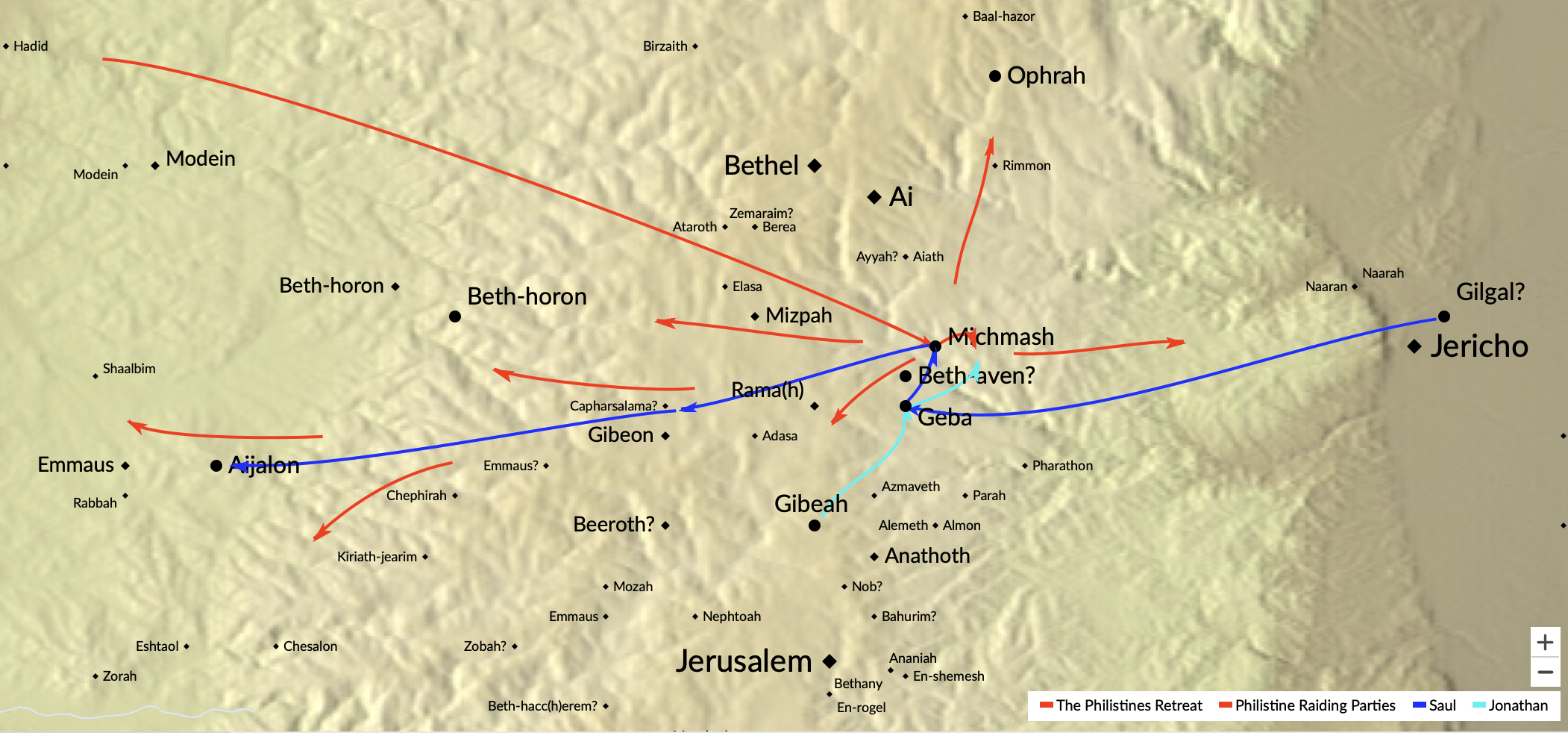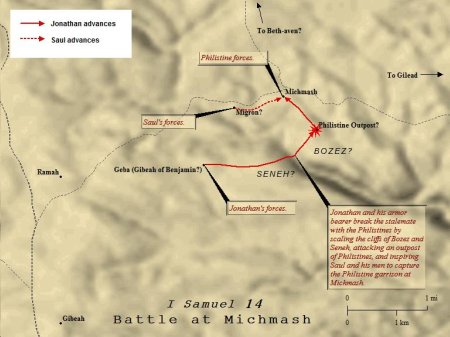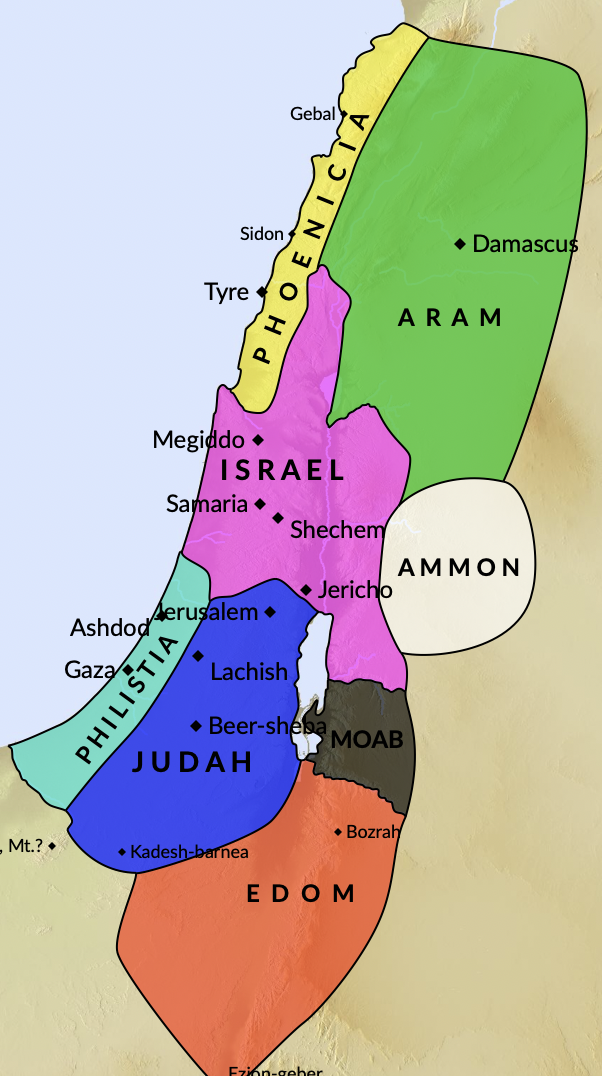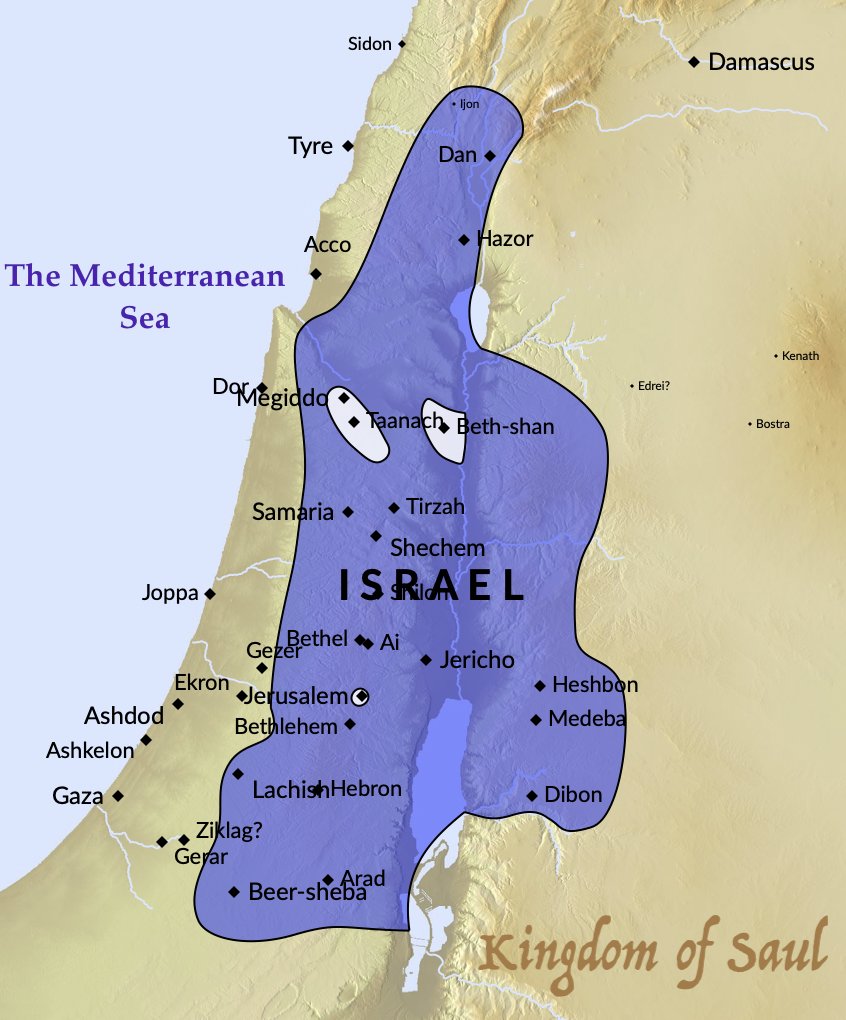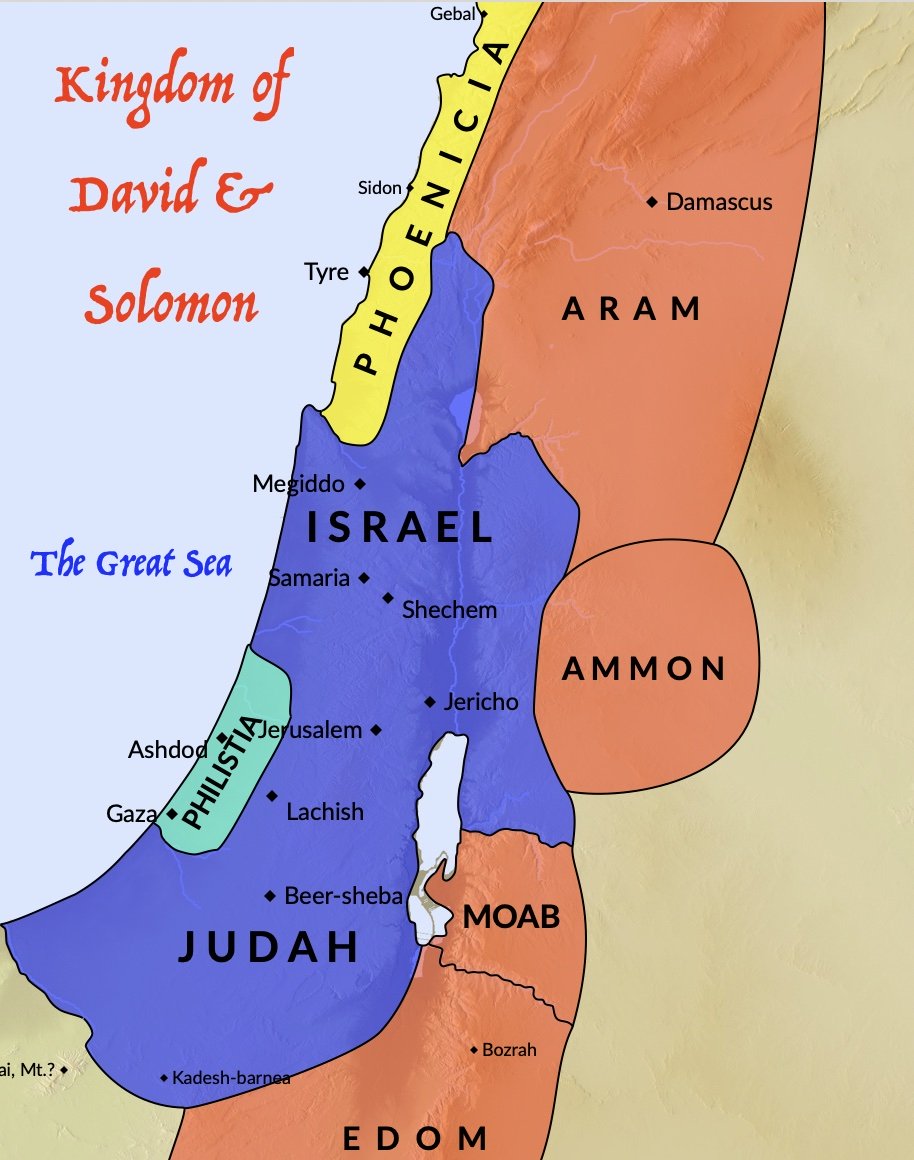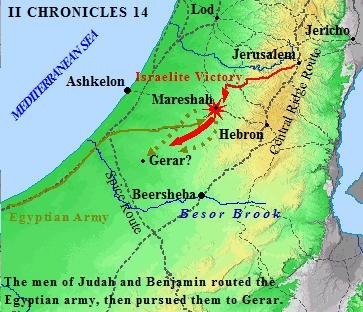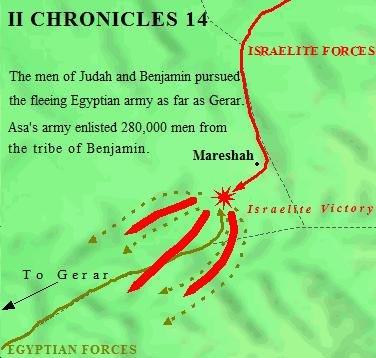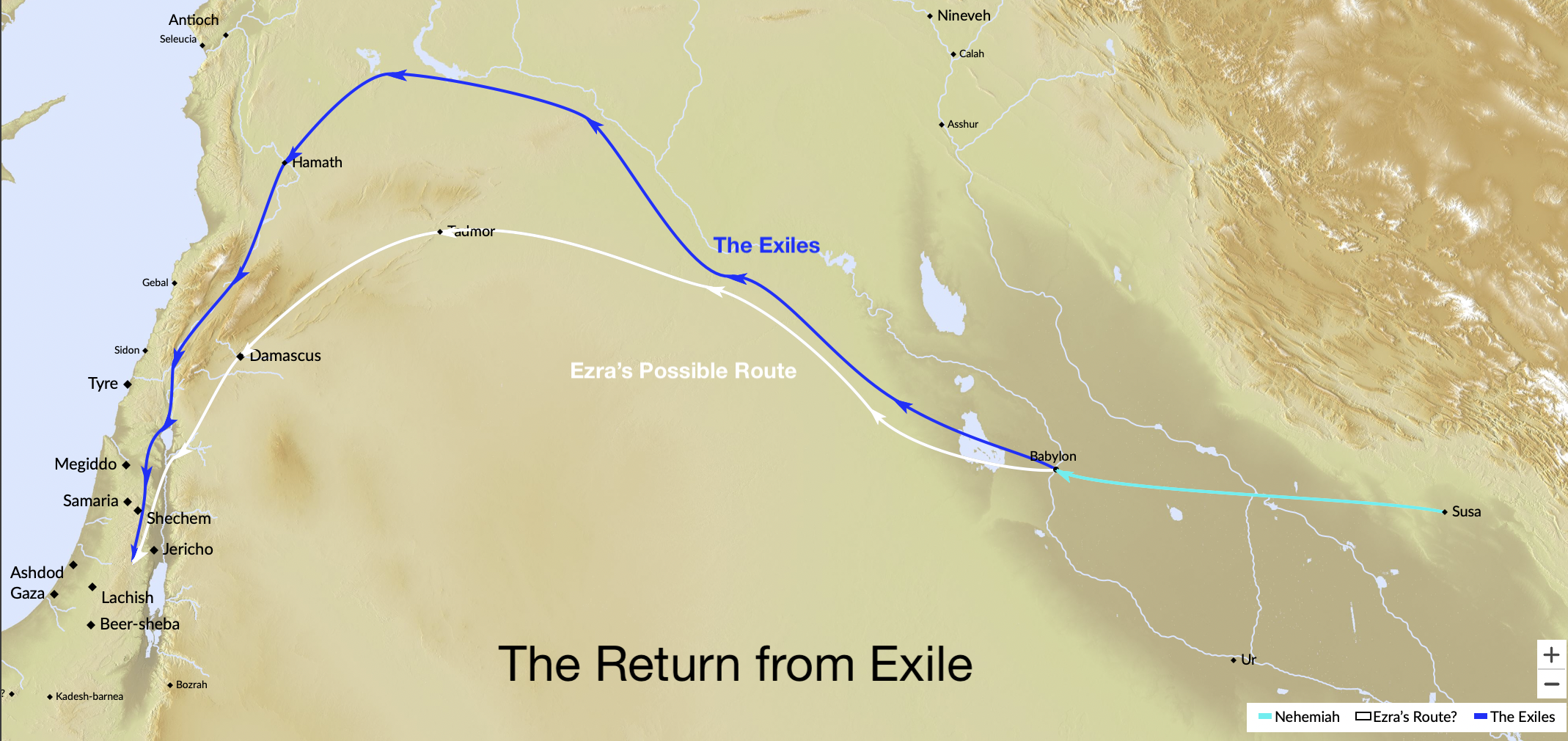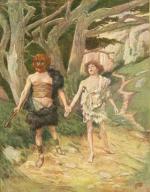- Biblical Maps
- Home Page
- History of Israel Blog
- Ancient Mesopotamia
- Map of Palestine
- Abraham
- Ancient Israel
- 12 Tribes of Israel
- Jerusalem
- The Book of Isaiah
- Palestine
- The Habiru
- Contact Us
- Bible Study Forums
- Media Page
- Visitors Sitemap
- Privacy Policy
- The History of the Old Testament
- In the Days of Noah
- The City of Jericho
VISIT OUR FACEBOOK PAGE!
The Benjamites, part 2 of 2
The Benjamites: The Levite & the Concubine
(click for Part I) The Benjamites faced extinction in Judges 19-21. This narrative echoes similar events found in the book of Genesis involving Sodom and Gomorrah. This particular event left a black mark on the tribe's history. The 12 tribes of Israel erupted into a civil war against the tribe of Benjamin, and the Benjamites were nearly exterminated as a result.
The dating of this event is uncertain. Many scholars feel as if it was at the very beginning of the Judges period, though the event covers the last three chapters of Joshua - the book before Judges in the Bible. This is one of the oldest narratives in the Bible. Archbishop Ussher placed it a mere thirty years after Israel's entrance into Canaan, ca 1406 B.C. Most place it during the stretch of time from Joshua's death to the beginning of the Judges. The Holman Bible Atlas dates Joshua at 1200 B.C., and the various episodes involving the Philistines around 1150 B.C., and Jephthah around 1100 B.C. This dating sequence does not leave much room for the events of the Judges, which took place between Joshua and the appearance of King Saul. An earlier date for Joshua, ca. 1400 BC, is argued by some.
This earlier date allows for a three hundred year period of The Judges. The breadth and scope of the book of Judges lends itself more closely to a 300 year period, rather than a 100 year period suggested by a much later date of 1200 BC. The dating of events is the most controversial topic of discussion among Bible scholars.
The Philistines had already arrived in Canaan by the time many of the Judges rose to prominence. Delilah was a Philistine in the epic story of Samson & Delilah. The Philistines were already present during the time of Samson. They were a thorn in Israel's side even before the Monarchy under Saul and David.
Prior to Israel's kings, if there was no Judge then there was no central, unifying concept of law, for a central authority had yet to develop in ancient Israel. God was intended to be their Law and central authority. Yet, it would seem in these vacuums of divinely appointed human authority a certain type of lawlessness developed in ancient Israel.
Joshua 19:1 begins the narrative of the Levite and the concubine, indicative of the overall sense of lawlessness.
"Now it came about in those days, when there was no king in Israel, that there was a certain Levite staying in the remote part of the hill country of Ephraim, who took a concubine for himself from Bethlehem in Judah."
The first thing to note is the spiritual state of Israel. As priests, Levites are supposed to separate themselves from the lusts and desires of the normal Israelite. The Levites were the priestly class. Marriage concerning a Levite was strict as to what type of priest may marry, and what type of woman that particular priest may marry. Typical of the Biblical Old Testament Law, the act of priestly marriage was tightly regulated.
At this point in Israel's history it would seem men were more or less on their own for protection and security. Scripture makes it plain there was "no king in Israel", and no Judge is mentioned either. There was a vacuum of authority, thus lawlessness. The entire passage displays a high degree of lawlessness on the part of those involved. Vs. 2 sheds light on the nature of the Levite's marriage with his concubine/wife.
"But his concubine played the harlot against him, and she went away from him to her father's house in Bethlehem in Judah, and was there for a period of four months."
Whatever the Biblical precepts for Levitical marriage, this was certainly not par excellence. The story in Judges holds importance for two primary reasons. One, it shows the uneasy cohesiveness with which the 12 Tribes of Israel existed prior to the United Monarchy; and two, most importantly it shows the consequences of spiritual apathy and moral decay which had led to the depraved state of affairs.
Benjamites Page Contents
Click on a link below to view that section of The Benjamites.
The marriage does not appear blissful. It certainly does not reflect a Godly marriage. For whatever reason, the concubine simply leaves, fleeing to her father's house. In vs. 3 we learn she is actually the wife of the Levite. Throughout Scripture the word concubine oftentimes refers to some sort of slave, or in many cases, sex slaves, in other instances handmaidens. The handmaidens of Rachel and Leah were the concubines of Jacob. These were likely slaves.
Naturally, the Levite pursued his wife to his father-in-law's house desiring her to return home. Israelite society was very patriarchal. Women were marginalized. They were viewed, in many cases, as property. Thus the Levite set out to retrieve his rightful property. The Levite reached his father-in-law, who upon seeing his son-in-law "was glad to meet him". The Levite stayed for 3 days, then departed with his wife. It was a successful retrieval.
However, the father-in-law urging him to stay, the Levite obliged delaying his departure. On the fifth day of his
visit, the Levite turned down yet another invitation and set out with
his wife to return home. They set out from Bethlehem in the south, traveling northward towards the hill country of Ephraim.
They would have traveled along the Central Ridge Route the initial part of their journey. This was the rugged hill country, and travel could be arduous and dangerous. Jerusalem , Jebus at the time, was 6 miles north of Bethlehem, also along the Central Ridge Route.
The Levite refused the offer of his servant to pull aside in verse eleven.
"When they were near Jebus, the day was almost gone; and the servant said to his master, 'Please come, let us turn aside into this city of the Jebusites and spend the night there."
Dr. Earnest Martin figures the Levite left Bethlehem around 4 o'clock in the afternoon. Their late start, due to the woman's father-in-law, led to an ill-advised situation. The day had come to a close and nightfall was not far off. The first city they approached, or first lodging place, would have been the logical place to stop. Venturing further at night would have been especially risky with a woman.
However, Jebus was a Canaanite stronghold at the time and likely not friendly to the Jewish population. The Levite, consequently, refused to stop at Jebus and decided to travel further on to Gibeah, or Ramah. The Levite had traveled six miles north from Bethlehem to Jebus. Gibeah was a city of the Benjamites, and lay only three miles north of Jebus. Naturally he thought his reception among the Benjamites, men of Israel as he was, would be far more hospitable. Vs. 14-15 tell of the Levite and his concubine's entrance into Gibeah.
"So they passed along and went their way, and the sun set on them near Gibeah, which belongs to Benjamin. And they turned aside there in order to enter and lodge in Gibeah. When they entered, they sat down in the open square of the city, for no one took them into his house to spend the night."
In the ancient world a special emphasis was placed on hospitality. It was considered one of the chief virtues. In v. 15 the Benjamites of Gibeah do not show hospitality to the Levite and his concubine. This, as it turned out, would be the least of their sins. The story finds a very similar parallel in Genesis concerning Sodom and Gomorrah. In fact, the two tales are nearly identical. For just as the Sodomites lacked hospitality, so do the Benjamites. Unfortunately for the tribe of Benjamin the similarities would not stop there.
The Levite and concubine encounter an old man in Judges 19:16.
"Then behold, an old man was coming out of the field from his work at evening. Now the man was from the hill country of Ephraim, and he was staying in Gibeah, but the men of the place were Benjamites."
The verse indicates the old man was not one of the local Benjamites, but rather from the hill country of Ephraim and likely an Ephraimite. It has been noted in previous articles that the Ephraimites and Benjamites shared a close bond and the two tribes oftentimes settled within the borders of each other freely. The old man encourages the Levite to come and stay the night with him. He warned the Levite not to spend the night in the open square. Strangers to a city with no place to stay often slept in the city square. However, in some cities this was dangerous. It appears as if Gibeah was one of those cities. The implication from the old man is the Benjamites of the city are blood thirsty individuals. Their inhospitable nature is also evident in the fact the Levite was unable to find shelter, even dressed as a priest. People typically go out of their way for a man of God - not so in Gibeah. V. 22 introduces these unscrupulous Benjamites.
"While they were making merry, behold, the men of the city, certain worthless fellows, surrounded the house, pounding the door; and they spoke to the owner of the house, the old man, saying, 'Bring out the man who came into your house that we may have relations with him."
Shades of Sodom and Gomorrah are clear. Compare these verses to Genesis 19:2-5. The Benjamites, just as the Sodomites, surrounded the house and pounded on the door demanding the respective guests be handed over. The Benjamites, just as the Sodomites, wished to force themselves upon the strangers. And just as Lot offered up his daughters to the mob, the old man offered his daughter; and the Levite offered up his concubine to the lust-hungry Benjamites (v. 23). The extent of the Benjamites lust and depravity is seen in vs. 25-26. In this passage the men of Benjamin are indeed ravenous wolves, and the concubine becomes their divided prey.
"But the men would not listen to him, so the man seized his concubine and brought her out to them. And they raped her and abused her all night until morning, then let her go at the approach of day. As the day began to dawn, the woman came and fell down at the doorway of the man's house where her master was, until full daylight."
The scene is one of blood-thirsty lust and immorality. The woman was gang raped and beaten "all night until morning". These were not local Canaanites. These were Benjamites, sons of Israel, members of the chosen nation of God Almighty. They claimed membership to the tribe descended from the twelfth son of Jacob, the younger brother of Joseph. Yet, their actions were those of Sodomites. Whether they let her go, or she escaped - perhaps after they had all passed out from drunkenness and blood-lust - Scripture does not reveal. However, it is clear the Benjamites had their way with her until morning.
After sunrise, beaten, bloody and battered, the woman made her way back to the Levite and the old man. By the time she arrived she was near death. In fact, she collapsed at the doorstep. Verse 27 gives her exact position.
"When her master arose in the morning and opened the doors of the house and went out to go on his way, then behold, his concubine was lying at the doorway of the house, with her hands on the threshold."
She had collapsed reaching for the door handle. It took all of her energy to simply get back to her lodging place. She died reaching for the door. The concubine was dead and laid there for quite some time, as Scripture indicates she lay at the threshold "until full daylight".
The Levite's response seems equally cold in verse 28. He shows no sadness, as he demands she arise and depart with him. The woman obviously did not respond as she was dead. Realizing she is dead, he simply "placed her on the donkey" and set out on his way.
The callous reaction from the Levite towards the woman's death is almost as disturbing as the Benjamites treatment of her in the first place. The Levite was a representative of God and held to a higher standard. He was supposed to nurture the sick and dying. He was a priest and supposed to exhibit the compassion of God. The barbarity of the story escalates when the Levite reached his home in verse twenty-nine. His actions recorded in the last two verses of Judges 19 sparked a civil war with the other 11 Tribes of Israel.
Judges 19:29-30
" 29 When he entered his house, he took a knife and laid hold of his concubine and cut her in twelve pieces, limb by limb, and sent her throughout the territory of Israel. 30 And it came about that all who saw it said, 'Nothing like this has ever happened or been seen from the day when the sons of Israel came up from the land of Egypt to this day. Consider it, take counsel and speak up!"
Judges 20 opens with the men of Israel debating on what to
do about such an atrocity. Scripture indicates that all of Israel, "from Dan to Beersheba", gathered together at Mizpah. This included men from Gilead, or the Transjordan tribes east of the Jordan River. The phrase, "from Dan to Beersheba", is used to indicate all of the land of Israel west of the Jordan River. Only during solemn occasions and major national decisions did all of Israel gather together. This was, indeed, one of those occasions.
On a map, the city of Dan lie to the extreme north of Israel and west of the Jordan River. Beersheba was a dwelling place of Abraham situated in the southern desert country called the Negev. Thus from Dan to Beersheba
included all men from the northern most and southern most parts of Israel west of the Jordan River. The phrase "including the land of Gilead" indicates the tribes east of the Jordan River were also present - in which case bringing all 12 Tribes together. The Transjordan tribes (East of the Jordan) had much less interaction with the other
tribes of Israel. The north and south of Israel west of the Jordan River, from Dan to Beersheba,
frequently interacted with each other. The Transjordan tribes of Gad, Reuben and East Manasseh withdrew to themselves after fulfilling their
obligations to Moses. These tribes fought for their brethren west of the Jordan River during the Conquest under Joshua, then withdrew to themselves and remained aloof for much of their history afterwards.
However, on this occasion all of Israel gathered together against the Levite and the Benjamites. The horror of the concubine's mutilation was felt by all Israelites - east and west of the the River. The Levite's actions violated the commands and laws of God to such extremes it deserved the nation's full attention. Failure to bring into account this sin could bring God's wrath on all of Israel.
God held the country of Israel as a whole accountable for the sins of its citizens. The sin of Achan (Joshua 7:16) during the reign of Joshua was clear indication and precedent for God's sense of accountability. Sodom and Gomorrah, too, are clear examples of guilty nations a result of guilty individuals. God's Word is clear that not only are individual's accountable for their actions, but so was the nation as a whole accountable for the actions of each man, woman and child within it. Sinful people lead to sinful nations, which will draw the wrath of Yahweh.
The Levite journeyed to Mizpah in order to meet with the congregation of Israel and defend his actions. Scripture is silent as to what the Benjamites were doing. The other tribal leaders of Israel were not happy with receiving a dead woman's body part in the mail, and asked the Levite what led to such an act in verse three. Judges 20:4-6 depict the Levite's response.
"...I came with my concubine to spend the night at Gibeah, which belongs to Benjamin. But the men of Gibeah rose up against me and surrounded the house at night because of me. They intended to kill me; instead, they ravished my concubine so that she died. And I took hold of my concubine and cut her in pieces and sent her throughout the land of Israel's inheritance; for they have committed a lewd and disgraceful act in Israel."
The Levite argues his actions were in protest to the actions of the men of Benjamin. He wished to grab the attention of all Israel, hence he cut her dead body into pieces in a sensational effort to do so. He succeeded, as Scripture records "then all the people rose as one man" united against the Benjamites. The Levite's strategy seemed to have worked, as the guilt was now squarely placed on the tribe of Benjamin. Judges 20:10 describes the Israelite's battle plan against Benjamin. Notice how their plans are made immediately after the Levite's speech. They do not consult God first. Perhaps they rushed to action assuming God was with them.
Verse eleven skips ahead to the scene of the battle. All of Israel, from Dan to Beersheba including the men of Gilead, surrounded the city of Gibeah. Evidently word had leaked to the Benjamites of the verdict in Mizpah, for verse fourteen mentions "the sons of Benjamin gathered from the cities to Gibeah", no doubt in defense of their tribal brethren. The scene was ripe for a full fledged civil war. Israel, however, gave the Benjamites one last opportunity to turn over the guilty people.
"...But the sons of Benjamin would not listen to the voice of their brothers, the sons of Israel."
They refused to hand over their fellow tribesmen. The Benjamites had made their minds up to go to war, despite the odds being stacked heavily against them. Such a willingness to fight against extreme odds shows the mindset of the men from Benjamin. They were indeed ravenous wolves, ready to pounce on their prey, with no care of being badly outnumbered. Scripture reveals Israel had mustered a force of 400,000 men. This is a huge force gathered from eleven tribes. The Benjamites numbered 26,000 men. The odds were massively stacked against the tribe of Benjamin. Much has been made about the translation and interpretation of numbers in the Old Testament. Most of the debate revolves around the word "elef".
Further light is shed on the warrior-nature of the Benjamites in verse sixteen. Detail is given concerning the make-up and nature of their small yet fierce army.
"Out of all these people 700 choice men were left-handed; each one could sling a stone at a hair and not miss."
Once again Scripture speaks of Benjamites as being left-handed. This is a very interesting and peculiar characteristic of the Benjamites. In antiquity the left-hand was looked upon with disdain. University of British Columbia psychologist Stanley Coren gives an explanation as to why. Dr. Coren states;
"The early theory of disease was that it is caused by a demon. For the average right-hander the left hand does not work very well -- it must be because of a demon. So everyone who is left-handed must be in league with the devil. It's a universal belief."
Another theory is one more athletic in nature. It follows the theme the Benjamites were warriors. They thrived in battle and were eager for a fight. Any hitter in baseball, or wide receiver in American Football, can attest to the difficulty in hitting and catching left-handed pitchers and quarterbacks. Most people are right-handed, consequently a left-handed individual is unique. It is a much different angle and view on the ball coming from a left-handed perspective. Perhaps the Benjamites saw an advantage in being able to use the left-hand effectively in combat. Much of ancient warfare was hand-to-hand combat. In a time and culture that viewed the left-hand as evil and unclean, it would have been a completely different feel in battle fighting the Benjamites, as opposed to most other enemies. The Benjamites would have held a tactical advantage. It is clear these men were deadly accurate in their abilities as well. The fact they could deliver from an unusual angle further enhanced their deadliness.
After the Benjamites refused to surrender the guilty men, the men of Israel went up to Bethel to inquire of the Lord. At this point in the history of Israel the Ark of the Covenant was at God's House in Bethel. Only later, during the reign of David and Solomon, would the Temple and the Ark reside in Jerusalem. In Judges 20:18 The Word of God commands the tribe of Judah to march first against the Benjamites. Verse twenty-one depicts the outcome of the first battle.
"Then the sons of Benjamin came out of Gibeah and felled to the ground on that day 22, 000 men of Israel."
The mightiness of the Benjamites is seen after the results of day one. They slaughtered men from the tribe of Judah. This is an extremely fascinating event. The two tribes of Benjamin and Judah would later form the backbone of the southern kingdom of Judah - yet stand as mortal enemies in this instance. The Benjamites became the muscle behind the dynasty of King David. God would use this tribe in a might way. Yet here, in this early episode of Israel's ancient past, the Benjamites are depicted slaughtering their brethren after raping and beating to death a Levite's wife.
Spiro Zodhiates made an insightful comment on Judges 20:23 in his Greek-Hebrew NASB Study Bible. He states;
"Apparently the Israelites trusted in their army and the righteousness of their cause, and they did not include God in their planning."
The results of day two were no different than day one. The Benjamites came out from Gibeah against the men of Israel and slaughtered another 18, 000 of their countrymen. The civil war had claimed over 40, 000 men from the eleven other tribes of Israel in two days. Whether the numbers were actually this high or not is a matter of interpretation, but regardless the loss of life was unquestionably significant and one-sided.
Finally, in verse twenty-six, the men of Israel are seen prostrating themselves before the Lord in Bethel - as they should have done in the first place. Scripture reveals all of the people of Israel went to Bethel to plead for victory over the tribe of Benjamin.
"Then all the sons of Israel and all the people went up and came to Bethel and wept; thus they remained there before the Lord and fasted that day until evening. And they offered burnt offerings and peace offerings before the Lord."
The men of Israel showed a true heart of seeking after God's will, rather than a precursory trip to Bethel and then off to fight. The previous two days had confirmed what they had only witnessed before; the Benjamites were fierce and skilled warriors. In verse 28 God says;
"Go up, for tomorrow I will deliver them into your hand."
The strategy employed by the Israelites against the tribe of
Benjamin is exactly the same strategy Joshua employed in the battle of
Ai - following Jericho. The Israelites deployed three forces, according to Judges 20:33-34. One force was stationed at Baal-tamar, and it seems another force was positioned at Maareh-geba.
The third force was a group of "ten thousand choice men from all Israel". This force was the group which would attack Gibeah. In essence, these ten thousand men were the bait. Yet, they were "choice" men, meaning skilled in war. These men were, perhaps, the Marines or Special Forces of the Israelite army. Their mission was not an easy one. They would engage the
Benjamites, then turn and feign retreat. Hopefully the
Benjamites would pursue, being overconfident from their previous two
slaughters. As they pursued the fleeing force the rear would be
exposed, at which point the two Israelite forces left behind would fall upon the
weakened city. The ambush was set.
The force of 10,000 would have to hold their own until the smoke from the city rose in the distance. The smoke would cause the Benjamites to flee back to the city for their families. The Israelite forces left behind would pounce on the unsuspecting Benjamite warriors, utterly destroying them. An this was exactly what happened according to Judges 20:33-48.
The initial battle "became fierce" at the outset. However, the force of 10,000 Israelites "turned in the battle, and Benjamin began to strike and kill about thirty men of Israel". This was the bait in action. The forces were said to have been in hiding at Baat-tamar and Maareh-geba. These two places, though not positively identified, are very interesting. Baal-tamar translates as lord of palm trees. It was located within the tribal boundary of Benjamin, and many Biblical and textual scholars identify it with the Palm of Deborah from which the prophetess Deborah judged Israel. It was also associated with the groves of the Canaanite deity Baal, an infamous Old Testament god. The location of Baal-tamar has been identifed between Bethel and Gibeah; or between Gibeah and Ramah.
Maareh-geba is a place name closely associated with both Geba and Gibeah. The KJV translates this as; "the meadows of Gibeah". Net.bible.org has some interesting facts concerning the city. Others have suggested the interpretation should read; "to the west of Geba". Regardless, it seemed to lie to the east of Gibeah between Geba and Gibeah.The narrative is a bit confusing to read for the first time. The action does not follow chronological order from verse to verse. Thus the quotations from above are not in sequential order by verse, but indicate the initial stages of the battle as it happened.
For example, in verse thirty-nine we are told the Benjamites struck down thirty Israelites. Back in verse thirty-seven, however, we are shown a picture of the hiding forces in action. This, presumably, takes place as the Benjamites rush after the retreating force of 10,000 Israelites, striking down thirty of them in the process. Meanwhile, verses thirty-six and seven indicate the action back near the city.
"So the sons of Benjamin saw that they were smitten. When the men of Israel gave ground to Benjamin because they relied on the men in ambush whom they had set against Gibeah, the men in ambush hurried and rushed against Gibeah; the men in ambush also deployed and struck all the city with the edge of the sword."
Scripture gives us both accounts happening simultaneously. The divided forces of Israel had decided upon a signal beforehand, according to verse thirty-eight. Upon seizing the city, they set a cloud of smoke into the sky. The men of Israel would see that and know the city had been taken. The Benjamites would see it as well, and know immediately they had fallen for Israel's ploy.
In fact, verse forty-one indicates the Benjamites; "were terrified, for they saw that disaster was close to them." Upon seeing the smoke rising from their city, the Benjamites turned and fled back towards the city. However, the Israelites had anticipated this and fell upon the sons of Benjamin. Scripture portrays the men of Benjamin fleeing in all directions, scattered to the winds. The tide had turned on day three of the civil war, just as God had told the men of Israel it would.
Verses forty-three and four indicate that 18,000 Benjamites were
slain from Gibeah to just east of the city. These men, Scripture tells,
were all "valiant warriors". Not all of the Benjamites
were struck down east of Gibeah, however. The Benjamites had taken
flight to the east and to the north. Thus a portion of the Benjamites
fled into the wilderness to the rock of Rimmon, north of Gibeah. Their flight was in vain. Five thousand Benjamites were caught on
the highways and butchered by the pursuing Israelites. The congregation
of Israel had sworn to each other they would not stop fighting until
all the men of Benjamin were dead. Thus the Israelites chased after the
sons of Benjamin cutting them down along the way. By the end of the
massacre, all but 600 Benjamites had died at the hands of their fellow countrymen. The tribe had nearly been
exterminated from the face of the earth.
The tribe of Benjamin faced extinction like no other tribe of Israel had previously. This was a singular event in the history of Israel. Benjamin's atrocious actions led nearly to their annihilation. However, God turned the hearts of the Israelites in chapter twenty-one in regards to the future of the Benjamites. Scripture records they had previously killed all the women and children of the tribe of Benjamin.The predicament was obvious. Once the remaining 600 men of Benjamin died, so too would the tribe of Benjamin as no women were left for the men. Though the Benjamites would exist in pockets of families and clans, they would cease to exist as a tribe. Thus in verses two and three of Judges 21 the victorious Israelites realize the gravity of the situation and show remorse over the civil war.
"So the people came to Bethel and sat there before God until evening, and lifted up their voices and wept bitterly. And they said, 'Why, O Lord God of Israel, has this come about in Israel, so that one tribe should be missing today in Israel?"
Verse four depicts these same Israelites building an altar to the Lord the next day. Upon this altar they burned burnt offerings and peace offerings to God Almighty. They were truly remorseful over the prior events, and saddened by the loss of their brethren. None of the tribes of Israel wanted to lose an entire tribe. However, they had pledged prior to not give their daughters in marriage to the Benjamites. The question arose as to how they could find the Benjamite men wives?
In Judges 21 the men of Israel assemble together and formulate a plan to obtain wives for the Benjamites. Their foolish pledge to keep their daughters from the Benjamites had placed the tribe on the brink of extinction. Their answer was to murder the men and women, "who had lain with a man", from the city of Jabesh-gilead. The virgins they would keep. Verse eight reveals their plan.
"And they said, 'What one is there of the tribes of Israel who did not come up to the Lord at Mizpah?' And behold, no one had come to the camp form Jabesh-gilead to the assembly."
The men of Israel assembled a force of 12,000 "of the valiant warriors". These men marched against Jabesh-gilead. Jabesh-gilead belonged to East Manasseh. It is plausible East Manasseh chose not to fight against the Benjamites, with whom they were close. Their inaction, though, cost them dearly. Scripture relates Israel killed every man and woman in the city. Only the virgins were left alive. These were to be provided for the Benjamites as wives.
"And they found among the inhabitants of Jabesh-gilead 400 young virgins who had not known a man by lying with him; and they brought them to the camp at Shiloh, which is in the land of Canaan."
The narrative clearly indicates there was much division among the 12 tribes of Israel. Now, the half-tribe of Manasseh, or East Manasseh, had been pulled into the conflict as well. Their allegiance to Benjamin should come as no surprise. It is somewhat surprising that the tribe of Ephraim is not mentioned as being on the side of Benjamin as well. The three tribes were very close.
Four hundred virgins from East Manasseh are rounded up and taken to Shiloh. By doing this the men of Israel accomplished two feats, in their minds. One, they punished those that failed to do their duty as Israelites, and that was to gather and fight for a Godly cause. And two, they secure brides for the Benjamites, thus procuring the future for the tribe.
The plot is set into motion in verses nineteen and twenty. After securing the virgins, Israel dispatched messengers to the Benjamites.
"So they said, 'Behold, there is a feast of the Lord from year to year in Shiloh, which is on the north side of Bethel, on the east side of the highway that goes up from Bethel to Shechem, and on the south side of Lebonah. And they commanded the sons of Benjamin, saying, 'Go and lie in wait in the vineyards, and watch, and behold if the daughters of Shiloh come out to take part in the dances, then you shall come out of the vineyards and each of you shall catch his wife from the daughters of Shiloh, and go to the land of Benjamin."
Thus the Benjamites hid and waited for the virgins to show up. However, they were under the impression these women were from Shiloh. The men of Israel did not tell the Benjamites of how these women were really obtained. Whether the Benjamites knew or not Scripture does not state outright. Yet in verse twenty-three the Benjamites stormed down on the unsuspecting virgins of Shiloh/East Manasseh and took for themselves wives among the women.
This is certainly not an image of a godly and righteous nation. God did not intend for marriage to be a free for all on unsuspecting virgins taken from their homeland after their families and friends had been killed. The story reeks of paganism and Canaanite culture. This was not a holy time in the history of Israel. The Benjamites were certainly guilty, although the other eleven tribes of Israel shared the burden of guilt as well.
The last verse in the book of Judges seems to echo this sentiment. Judges 21:25 reads;
"In those days there was no king in Israel; everyone did what was right in their own eyes."
Even the logic for Israel's waywardness is off target. It is not because they do not have a king, but rather it was because they failed to acknowledge the King they already had. God's story throughout the Old Testament is one of leading His people, when they allow him. Their desire for a human king overshadowed their faithfulness to God. It is this lack of an earthly king the author of Judges stresses was the reason they did what was right in their own eyes. However, the future kings of Israel would lead the people astray time and time again as well. Human nature is human nature, whether that human be a pauper or a king makes no difference.
Perhaps the author meant to convey the idea that God's commands were not being followed by saying there was no king to lead them in the statutes and commands of God. Every good church has a great preacher. Every solid nation has a solid leader. However, as time would prove, even the most righteous of kings, king David, was an adulterer and murderer. Israel's continual dependence on man is their downfall throughout much of the Old Testament.
This incident involving the Benjamites is certainly one of the most puzzling and disturbing passages in the Bible. The brutality of the narrative is vivid and extreme. Biblical scholars and critics have assorted opinions as to the nature and make-up of the narrative, as well as to the dating, as we touched on above.
Many early German scholars pronounced this passage as an invention, created to cover up "atrocities" committed by the tribe of Judah against the Benjamites. Those that support this view cite the Benjamites relationship to Saul and their devotion to Ish-bosheth as evidence of this theory. They claim these allegiances brought them into conflict with the tribe of Judah and king David. However, Benjamin later switched its allegiance to David. This line of thinking was popular in the late nineteenth century.
More recent Biblical scholarship thinks it more likely these events did happen, or the narrative at the very least rests on "historical fact" (Jewish Encyclopedia.com). One notices a shift in the nature of the Benjamites during the time of the Monarchy and exile. This event seems to have jarred the tribe of Benjamin into behaving as men of God; for in the remainder of the Bible the sons of Benjamin are seen in a far different light.
The Philistines & the tribe of Benjamin
The period leading up to the Monarchy of Israel was dominated by Philistine pressure. This pressure continually mounted against the Israelites, as these mighty and cruel warriors proved too tough for not only Israel, but Egypt and Canaanites as well. The events found in I Samuel 4 & 5 describe the events prior to the anointing of Saul. The Benjamites would have been directly involved, as these chapters took place in and around the tribal boundaries of Benjamin.
The great prophet Samuel judged Israel from the territory of the Benjamites. His home was located in Ramah, a city within the tribe of Benjamin. His circuit from from Gilgal, outside of Jericho, northeast to Ophrah, southeast to Bethel, southward to Ramah, and west to Jericho and Gilgal. This would have included the numerous towns and villages within the interior.
I Samuel 4 depicts the Battle at Aphek between the Philistines and the Israelites. Aphek was a strategic city of antiquity. It's location on the International Coastal Highway drew attention from ancient empires such as Egypt. A Late Bronze Age (ca. 1550 - 1150 B.C.) structure was unearthed at Aphek which archaeologists have called "The Egyptian Governors Residency". Jonathan Tubbs, in his book Canaanites, points out these structures were found in other cities as well which exhibit strong Egyptian influence, and were under direct Egyptian control during this time period.
By ca. 1050 B.C., the time period involved in I Samuel 4, the Philistines occupied Aphek. They fortified this strategic city as well. The Philistines had effectively thrown off Egyptian control, and established their own kingdom comprised at the core by five city-states, centered on the Coastal Plain and united under one Philistine government. They also had other settlements as well. By the time of I Samuel they had established what Michael Grant calls "inland frontiers". Aphek was one such "inland frontier".
At this point in Israel's history the Ark of the Covenant was kept in nearby Shiloh. With the Philistine presence mere miles to the west, Israel sensed invasion. They countered by moving a force of men to Ebenezer. Little lay between the holy city of Shiloh and the Philistine army to the west. Though Scripture does not indicate such, it is quite possible men from Benjamin comprised a large portion of this force. The Benjamites had shown themselves eager to fight in the past, and certainly responded as such to the Philistine threat.
The two camps had gathered near each other for battle; with the Israelites encamped at Ebenezer, and the Philistines entrenched in one of their fortified cities, Aphek. Verse two depicts the first engagement.
"And the Philistines drew up in battle array to meet Israel. When the battle spread, Israel was defeated before the Philistines who killed about four thousand men on the battlefield."
The elders of Israel responded by sending the Ark into the camp of Israel in order to lift the men's spirits and bring the presence of God to the very battlefield.
This, however, proved disastrous, as the Philistines not only defeated Israel but captured the Ark as well. Verse
twelve provides solid Scriptural evidence the men from the tribe did
indeed take part in the fight. For it was one of the Benjamites that
managed to escape and bring news of the disastrous defeat to Shiloh.
"Now a man of Benjamin ran from the battle line and came to Shiloh the same day with his clothes torn and dust on his head."
The man reported to Eli, the High Priest, what had transpired. Upon hearing the ark of God had been taken, Eli fell backward, broke his neck, and died. Such was the tragic state of Israel that day. The Philistines marched the Ark throughout their kingdom, yet everywhere it stopped disease and pestilence broke out. Eventually the Philistines sent the ark of God back to Israel. Though the Ark was returned, its initial loss surely had a tremendous and reverberating psychological impact.
The loss at Aphek left Israel vulnerable and exposed to the Philistine warriors, pictured in Egyptian writings as tall, slim warriors wearing kilts. The Philistines soon expanded inward, occupying and fortifying the city of Gibeah. Thus the Benjamites were pierced to the very heart by the occupation of a city within the interior of their allotment. The Philistine presence continued to encroach upon the Israelites and would soon threaten their very existence.
The mounting Philistine threat, combined with the loss of the Ark (though it was returned), the death of not only Eli, the High Priest, but his two sons as well, were major contributors to the plea for a king from the people of Israel. From the backdrop of these events emerged the great prophet Samuel. Despite his greatness, the corrupt nature of his sons prevented them from effectively judging, and finally led the people to demand their first king.
King Saul
In I Samuel 9 Scripture records the rise of Saul to the throne of Israel. Though the exploits of Saul are too numerous for our current aim, his impact on the tribe of Benjamin was considerable. Saul came from a proud family of Benjamites. His lineage is given in the opening two verses of chapter nine.
"Now there was a man of Benjamin whose name was Kish the son of Abiel, the son of Zeror, the son of Becorath, the son of Aphiah, the son of a Benjamite, a mighty man of valor. And he had a son whose name was Saul, a choice and handsome man, and there was not a more handsome person than he among the sons of Israel; from his shoulders and up he was taller than any of the people."
It would seem Saul came from a family of great warriors, though his family was not thought of highly. Scripture also emphasizes his impressive physical stature as well. He stood out amongst his fellow countrymen. He was a physically imposing man. He looked like what a king should look like on the outside.
In verse eleven God tells Samuel the king will come out of the tribe of Benjamin. This man will not only rise to the kingship, uniting all of Israel, but will drive out the Philistines, lifting the yoke of Philistine oppression. Samuel is to anoint the man God reveals. The fact this man was from the Benjamites surely surprised all of Israel. Even Saul himself is surprised when Samuel reveals to him God shall make him king over all of Israel. Saul's response is recorded in verse twenty-one.
"And Saul answered and said, 'Am I not a Benjamite, of the smallest of the tribes of Israel, and my family the least of all the families of the tribe of Benjamin? why then do you speak to me in this way?"
Saul himself could not believe Samuel's words. Much insight is given into the relationship of the 12 tribes of Israel. Apparently, according to Saul, the Benjamites were viewed of as non-factors. At this point in history, they most certainly were. One must keep in mind this does not take place too long after the events of the Levite and his concubine discussed above.
The tribe of Benjamin had been reduced to six hundred men, and time enough had not elapsed for that number to increase significantly. Saul's involvement in the Battle at Gibeah is not mentioned specifically in Scripture. It is quite possible he was not even born when the event transpired, and the tribe had grown somewhat by this time though still was the smallest of the 12 tribes of Israel. It is also possible that he even partook in the battle against Israel as one of the Benjamites involved. It is just impossible to tell the extent of Saul's involvement in the battle at Gibeah based on Scripture.
However, the Philistine threat remained real and imminent as Saul took the reigns of leadership. The Benjamites rose to a prominence never before experience amongst their brethren. One of their own had ascended to the throne. It was a glorious moment of redemption for the tribe of Benjamin. A king from amongst its ranks would erase the blemish of previous sins.
The next mention of the Benjamites occurs in I Samuel 13. Though not mentioned by name, the forces of Jonathan and Saul were most certainly compiled by many of their fellow Benjamites. It is not presumptuous to assume many of Saul's longtime friends filled the ranks of his administration. It is possible the majority of the kingdom of Israel was led by Benjamites in various roles throughout Saul's administration. His second in command was a Benjamite, his son Jonathan.
The Battle at Micmash
Prior to the battle, recorded in I Samuel 14, Saul had violated God's command, via Samuel. Samuel was the mouthpiece of God to Saul, yet Saul oftentimes refused to heed Samuel's instruction. The previous chapter was just such an instance. Saul had violated Samuel's instructions from God. Consequently, Samuel revealed to Saul that the kingdom would one day be tore from his hands, and given "to a man after His own heart".
It is safe to assume this did not please king Saul. Samuel departed the king's presence and returned to Gibeah. Saul remained at Gilgal, where he had previously sinned against God. The young kingdom lie in a precarious position. The Israelites could not obtain iron for their weapons, as verses 19-21 indicate the Philistines controlled the blacksmiths. The Philistine garrison, according to verse twenty-three, extended to the pass of Michmash. Saul had just drawn the disfavor of God and Samuel.
The opening verses of chapter fourteen depict Jonathan's
courageous attack on the Philistine garrison near Michmash. The
Benjamites had a legacy of heroic warriors, extending to the deliverance
of Ehud centuries earlier, that were surely on the front of every
Benjamite mind. Jonathan sought to live up to his forefather's example
by attempting a daring raid on the Philistines.
Scripture sheds light on the make-up of the Israelite and Philistine forces. The Israelites numbered 3, 000 men total. Their forces were divided into two groups; one under the leadership of king Saul, and the other under the leadership of his son Jonathan. The forces of Jonathan were 1, 000 strong, and stationed in Gibeah of Benjamin. Saul's forces were 2, 000 strong and stationed near Michmash. Though verse two states "in Michmash", the actual location is outside the city, as is evident from the passage in I Sam. 10:5. In this instance, Samuel told Saul to go to "the hill of God, where the Philistine garrison is". The map included indicates Migron as a possible location, though this cannot be verified with fact. Regardless, the two forces were keyed on Michmash. In Michmash, Scripture indicates 30, 000 Philistine chariots and men were keyed on the Israelites. Their front guard was stationed a few miles off. This would be the guard Jonathan slaughtered, inspiring the Israelites to victory.
The odds were overwhelmingly in favor of the Philistines. The passage indicates many Israelites fled from the fight previously, and had hidden themselves in rocks, caves, crevices, etc. Only 3, 000 soldiers remained. Though it may be presumptuous to say so, it is likely many of these men were Benjamites, backing their brethren to the death if need be. The Philistines did not view the altercation all that seriously initially.
God used the Philistine arrogance against themselves. Jonathan and his servant crossed the pass to the side of the Philistine camp, identifying themselves to the front guards on duty. The Philistine reaction is recorded in I Samuel 14:11.
"And when both of them revealed themselves to the garrison
of the Philistines, the Philistines said, 'Behold, Hebrews are coming
out of the holes where they have hidden themselves.' "
It is interesting to note the Philistines identify them as "Hebrews", in a condescending and perhaps playful tone. The term took on a negative connotation when used by enemies of the Israelites. One will take notice "Israelites" is often used in instances where the people are looked upon favorably. "Hebrews" is oftentimes used to emphasize the inferior status of the Jewish people.
One recalls when Scripture reveals Joseph and his brothers must eat dinner separate from the Egyptians because "the Egyptians could not eat bread with the Hebrews". Even prior, the appellation Hebrews is used when speaking of the Jewish people in slavery, or under oppression.
Thus the Philistines mockingly gestured for Jonathan and his servant to approach, not worried in the least about the ravenous nature of the Benjamites. Jonathan pounced on his prey, as he and his servant struck down "twenty men within about half a furrow in an acre of land".
So shocking was Jonathan's gallant victory Scripture records all of the region felt it in verse fifteen.
"And there was a trembling in the camp, in the field, and among all the people. Even the garrison and the raiders trembled, and the earth quaked so that it became a great trembling."
God seemed to have coupled Jonathan's act of faith with an earthquake that sent the Philistine camp into chaos. The sign from God was not lost on the Israelites, as they faithfully followed up Jonathan's brave act.
The men of Saul and Jonathan, the Benjamites and other men of Israel making up the forces of king Saul, rallied and drove the Philistines from Michmash. The victory that day was a great one in the eyes of the people, solidifying Saul's authority and ability as king. The men of Israel drove the Philistines northward past Beth-aven.
They regained critical ground and confidence. Though the war with the Philistines was far from over, this key battle proved monumental in the reign of king Saul. God had delivered His people once again from seemingly impossible odds.
The Benjamites & the kings of Israel and Judah
However, with the death of Saul the Benjamites would once again find themselves entangled in a situation bordering on civil war. Saul's son Ish-bosheth is anointed king upon Saul's death. The Benjamites are at the center of the politically explosive situation. Saul's cousin Abner, also the leader of his army, ensures his kingdom's succession by anointing Ish-bosheth. The kingdom, however, is divided as to its loyalties. II Samuel 2:8-10 tells of the events.
"But Abner, son of Ner, Saul's commander, had taken Ish-bosheth the son of Saul, and brought him over to Mahanaim. And he made him king over Gilead, over the Ashurites, over Jezreel, over Ephraim, and over Benjamin, even over all Israel. Ish-bosheth, Saul's son, was forty years old when he became king for two years. The house of Judah, however, followed David."
This was the stretch of time David ruled from Hebron, south of Jerusalem. I Chronicles 12:29 mentions 3, 000 Benjamites that defected from Saul's camp to David during this stretch of time in Hebron.
"And of the sons of Benjamin, Saul's kinsmen, 3, 000; for until now the greatest part of them had kept their allegiance to the house of Saul."
Hebron was the capital of David's kingdom at this time, thus his supporters gathered together there with him. They are listed by tribe in this passage found in I Chronicles.
Jerusalem was still Jebus, under Jebusite control. This is why Ish-bosheth was crowned east of the Jordan. One notices the tribe of Ephraim is mentioned along with the Benjamites. Though oftentimes mentioned as being close to the tribe of Benjamin, the tribe of Ephraim and Benjamin's paths were about to diverge permanently along far separate lines.
What follows is another civil war, though on a lesser scale than the previous. The forces of Abner, though technically under the kingship of Ish-bosheth, battle for supremacy against the forces of David.
Ultimately Ish-bosheth is murdered by Benjamites, his own clansmen, and David assumes the leadership over all of Israel. From this point on the Benjamites would remain loyal to the house of David. Leaders and officials in both the regions of David and Solomon would hail from the tribe of Benjamin.
One of David's thirty "Mighty Men" from Scripture was a man named "Ittai, the son of Ribai of Gibeah, of the sons of Benjamin".
Dr. Earnest Martin points out in his article entitled, The Tribe of Benjamin, that every advantage would have been with the Benjamites joining the north. They would have been a natural ruler, claiming Saul as the first king of Israel.
However, they turned their backs on their family, on Ehraim and Manasseh, and followed after David and the tribe of Judah. God had a special role for the Benjamites within the southern kingdom of Judah.
This role is found in I Kings 11:36.
"But to his son I will give one tribe, that My servant David may have a lamp always before Me in Jerusalem, the city where I have chosen for Myself to put My name."
The one tribe was the tribe of Benjamin. The Benjamites were to be a lamp unto Judah. The Benjamites, as will be seen, fought at the side of David and his kingdom of Judah. They defended their home with bravery. God Himself had blessed them by putting His Temple in their city.
The Benjamites received this unique honor, according to some Rabbinnic traditions, because they were the one brother of Joseph that did not participate in the selling of him into slavery. God, thus, rewarded Benjamin by claiming one of their cities as His.
I Kings 4:18 lists Shimei the son of Ela as one of Solomon's officials. This man was of the Benjamites as well. He was one of Solomon's Twelve Deputies. These men were responsible for providing for the King's household for one month of the year. Provisions for this month would presumably be gathered from among the clans of the tribe prior to the month of their responsibility. This was a grave and serious task.
Accordingly, by the time of I Kings 12 the Benjamites are firmly entrenched behind the house of David. I Kings 12 is significant because this is the chapter which records the schism which would forever divide Israel. At the time of Solomon's death, his son Rehoboam ascended to the throne. In chapter twelve he goes to Shechem to be crowned king.
However, Jeroboam, exiled to Egypt unjustly by Solomon, returns and along with other representatives of Israel confronts Rehoboam in Shechem. The result is a split in the kingdom, with Jeroboam I becoming the first king of Israel; and Rehoboam becoming the first king of the southern kingdom of Judah. The Benjamites remained loyal to Judah, along with the tribe of Simeon. The other nine tribes, however, united behind Jeroboam and Israel.
It was at this point the city of Jerusalem became the capital of the southern capital of Judah. Previously, King David had conquered it from the hands of the Jebusites, something the Benjamites could never accomplish on their own. He had established it as the capital of all Israel. Now, however, it remained as the capital of the south only. This was a distinct advantage for the smaller southern kingdom of Judah.
For just as Moses had predicted earlier, the Temple of God remained in its land, as Benjamin remained loyal to Judah. Jerusalem would become associated with Judah from this point on in its history. In verses twenty and twenty-one the Benjamites find themselves on the brink of civil war once again.
"And it came about when all Israel heard that Jeroboam had returned, that they sent and called him to the assembly and made him king over all Israel. None but the tribe of Judah followed the house of David. Now when Rehoboam had come to Jerusalem, He assembled all the house of Judah and the tribe of Benjamin, 180, 000 chosen men who were warriors, to fight against the house of Israel to restore the kingdom to Rehoboam the son of Solomon."
The lines had officially been drawn. The southern tribes of Judah, Benjamin, and Simeon followed after Rehoboam and formed the southern kingdom of Judah; whereas the northern tribes stood behind Jeroboam, the exile returned from Egypt, and became known as the northern kingdom of Israel.
The period of the Divided Kingdom became one of inter-tribal jealousies and rivalries. Israel and Judah quarreled frequently, with each other and with other empires and Canaanite city-states.
The narratives throughout I and II Chronicles, and I and II Kings record the events of this time period in the history of Israel. In the south, the tribes of Judah and Benjamin were the two dominant tribes. Simeon seems to have been absorbed into Judah, and is seldom mentioned again in Scripture.
The Benjamites & King Asa
The Benjamites, however, continue to appear throughout the pages of the Bible. One interesting encounter involving the Benjamites took place during the reign of King Asa in II Chronicles 14. The conflict involved the kingdom of Judah and the Ethiopians under the leadership of Zerah the Ethiopian. Spiros Zodhiates claims this is probably Osorkon I, the second ruler of the twenty-second dynasty of Egypt.
Osorkon I was the successor to Sheshenk I, the same as Shishak of Egypt. Shishak marched against Judah in the days of Rehoboam. This incident is recorded in II Chronicles 12:2. Thus Egyptian invasion was nothing new to Judah in it's early years. Rehoboam ruled Judah from ca. 926 - 910 B.C.; and Asa ruled ca. 908 - 868 B.C. Scripture clearly indicates Egypt and Israel remained rivals throughout the centuries following the Exodus.
In verse eight the army of king Asa is given.
"Now Asa had an army of 300, 000 from Judah, bearing large shields and spears, and 280, 000 from Benjamin, bearing shields and wielding bows; all of them were valiant warriors."
This verse indicates the Benjamites were still known for their ability with the bow and arrow. They were continually associated with the sling and bow throughout the Old Testament. It often seemed they were facing stout odds at best. This occasion was to be no different. Zerah's army is listed as numbering "one million men and 300 chariots". Obviously, there were not literally one million men in Zerah's army. However, the odds were greatly stacked against Judah; it was two tribes against a nation.
Earlier in chapter fourteen Scripture relates how Asa cleansed the land of the temples, and altars of the pagan gods of the Canaanites. He instituted religious reform throughout Jerusalem and Judah, for which he drew the praise and favor of God. The Lord blessed Asa with peace, at which time he was able to fortify a number of cities. This was the first major encounter of Asa's rule, and his response in verse eleven reflected his actions of righteousness.
"Then Asa called to the Lord his God, and said, 'Lord, there is no one besides Thee to help in the battle between the powerful and those who have no strength; so help us, O Lord our God, for we trust in Thee, and in Thy name have come against this multitude. O Lord, Thou art our God; let not man prevail against Thee."
The forces had gathered in the valley of Zephathah in Mareshah. Mareshah is one of the "fortified cities in Judah and Benjamin" built up by king Rehoboam years earlier, recorded in II Chronicles 11:8. Its fortifications would come under scrutiny to say the least against the horde of Ethiopians under Zerah. King Asa did not hesitate in calling upon the name of God to deliver them from the Egyptians. In typical faithfulness God delivered the Benjamites and Judah from Zerah in verses twelve and thirteen.
"So the Lord routed the Ethiopians before Asa and before Judah, and the Ethiopians fled. And Asa and the people who were with him pursued them as far as Gerar; and so many Ethiopians fell that they could not recover, for they were shattered before the Lord, and before His army..."
Scripture relates Judah destroyed the cities around Gerar. They plundered the area; "for the dread of the Lord had fallen upon them". After their rampage the men returned to Jerusalem. Thus king Asa continued to do right in the eyes of the Lord. Unfortunately he would stray from the path later in his life and reign. Years later the seer Hanani confronts king Asa on his waywardness, reminding him of the Lord's deliverance from the Ethiopian army in II Chronicles 16:8.
"Were not the Ethiopians and the Lubim an immense army with very many chariots and horsemen? Yet, because you relied on the Lord, He delivered them into your hand."
Hanani's next words are some of the most profound in all of the Bible.
"For the eyes of the Lord move to and fro throughout the earth that He may strongly support those whose heart is completely His."
The Benjamites continued to display their renewed heart as they stood valiantly behind the Davidic throne, despite overwhelming odds time and again. Asa's heart, however, would become hardened; and in II Chronicles 16 he died of a severe disease, refusing to the end to put his trust back in God. The tribe of Benjamin, accordingly, remained loyal to the house of David throughout the reign of Asa, and the Benjamites continued their support throughout the empire's history.
In fact, so entwined are the Benjamites with the kingdom of Judah that Nadav Na'aman argues in his article The Kingdom of Judah Under Josiah; "the broad geographical areas apparently corresponded to the districts of the kingdom" of Judah. These "broad geographical areas" included; the Negev, the Judean Hill Country, Jerusalem, the Shephelah, and the land of Benjamin. King Josiah is believed to have ruled ca. 639 - 609 B.C.
It is important to note that although Simeon lost it's identity, the Benjamites maintained theirs. Even though their tribal allotment fell under the government of the kingdom of Judah, it maintained its tribal autonomy, acknowledged by the identification of the "land of Benjamin" as a district within the kingdom. The phrase "the land of Benjamin" indicates a familiarity with the land indicated. The tribal boundaries of Benjamin, along these lines of thinking, maintained the same lines as before, even though now governed by Judah. As a light to Judah, the tribe of Benjamin would maintain a certain privileged status. The very House of God was within its borders.
The frontier of Benjamin would again take on significance during this time of rivalry kingdoms. Benjamites found themselves on the border of the kingdom of Israel and Judah, as mentioned previously. However, with the fall of Israel at the hands of the Assyrians in the eighth century, the pax Assyriaca ushered in an era of mobility on the frontier. This period of peace brought on by Assyrian invasion, as Na'aman points out, allowed Benjamites to move freely into and out of the tribal land of Ephraim. The Ephraimites had been exiled by the Assyrians as they were part of the northern kingdom of Israel.
Benjamite families, thus, migrated and mingled with remnants of Ephraimite families. One such example, as pointed out by Na'aman, is that of Beriah. I Chronicles 7:23 mentions Beriah as an important Ephraimite family. Following the fall of the north, as mentioned above, Benjamites migrated to Aijalon, Lod, and Ono. Thus, in I Chronicles 8:13 Beriah is associated with the tribe of Benjamin as well. It is likely migrating Benjamites intermingled with the Ephraimite family of Beriah, thus his association with both tribes.
The kingdom of Judah, however, would soon face exile of its own. In 586 B.C. the Babylonians under Nebuchadnezzar laid siege to Jerusalem, burning the city and the Temple to the ground. The Temple treasure was looted and the people were exiled. Jerusalem would lay in a heap of ruins for several decades following this catastrophic event. The Benjamites continued to play a vital role in the kingdom throughout these difficult years. The great prophet Jeremiah hailed from the tribe of Benjamin, and preached of the impending doom for Judah in the hands of the Babylonians.
The Exile & Return of Judah
The Book of Ezra and the Book of Nehemiah cover the years from 457 - 432 B.C. and have to do with the return of the Israelites to Judah from Babylonian captivity. They had suffered under the hand of Babylon for eighty years. The book of Daniel deals specifically with the Babylonian kings. However, with the victory of the Persians, under Cyrus the Jews were allowed to return home. Ezra 1:1 opens with the proclamation of Cyrus'. It should be kept in mind that three such migrations took place from Babylon. Zerubbabel was the first ca. 536 B.C.; Ezra was the second in 457 B.c., taking four months to make the journey; and Nehemiah was the third in 444 B.C. The Benjamites role in this return to the Holy Land is seen in verse five.
"Then the heads of fathers households of Judah and Benjamin and the priests and the Levites arose, even everyone whose spirit God had stirred to go up and rebuild the house of the Lord which is in Jerusalem."
Thus the tribes of the southern kingdom of Judah kept their identity, whereas the tribes of Israel, exiled by the Assyrians had lost their identity. Scripture makes it evident the Benjamites, Levites, and men of Judah had kept their tribal identity intact. The Jews joyfully returned back to Jerusalem, first under Zerubbabel, in order to rebuild God's House. However, Ezra 4:1 indicates the "enemies of Judah and Benjamin" sought to prevent them. As one reads through the pages of Esther, Ezra, Nehemiah, Haggai, Malachi, and Zecheriah speak of these events and the continual harassment by the enemies of Israel. The last thing these peoples wanted was the Jewish presence back in the area.
The books of Ezra, Nehemiah and Esther cover approximately 100 years of history; dating from 536 - 432 B.C. The Benjamites were very influential during this transitional time. They remained a light to Judah, assisting in the rebuilding and establishment of God's House. They were returning to rebuild their city, to resettle their tribal inheritance. As stated previously, Scripture indicates certain Benjamites had stayed behind throughout all of the Babylonian captivity. The men of Benjamin were also allowed to live in Jerusalem.
In Ezra 10:9 all the men of Judah and Benjamin gathered to listen to Ezra address them. He accused the Benjamites and men of Judah as straying from the commands of God, and intermingling and marrying foreign women, and worshiping foreign gods. They had been unfaithful to God Almighty. Ezra urged them "to make confession to the Lord God of your fathers", and He would prove faithful. To this, the Benjamites and Judahites confessed their guilt before Ezra and God. Spiros Zodhiates beautifully described the efforts of these Israelites in the post-exile period;
"God empowered His chosen people to overcome all opposition, even against impossible odds."
Back to The Benjamites
Back to the Home Page
Back to the 12 Tribes of Israel
Recent Articles
-
The History of Ancient Israel
Dec 25, 23 02:16 PM
An easy to read history of ancient Israel from Old Testament times to today. -
The Ancient City of Jericho
Dec 18, 23 11:21 PM
The city of Jericho is one of the most ancient cities on earth. The city played a crucial role in a number of Bible stories. -
Story of Cain and Abel
Dec 17, 23 01:20 PM
The story of Cain and Abel is a tragic story of jealousy, rage and fratricide. It is the first murder in recorded history.
SAMUEL the SEER
Now Available in Print & eBook on Amazon!!
POPULAR TOPICS
Learn more about these popular topics below. The Bible is full of fascinating stories, characters and mysteries!
BIBLE MAPS
Explore the land of the Old Testament! View these maps of the Bible.
